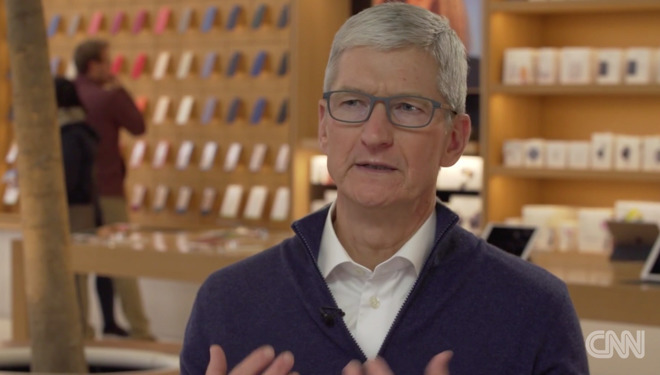After issuing an earnings forecast correction on Wednesday, Apple CEO Tim Cook sat down to discuss the anticipated revenue dip and a range of related topics including rising diplomatic tensions between the U.S. and China.
The 13-minute interview with CNBC runs the gamut — Cook discusses everything from iPhone subsidies to Apple's trade-in program — but it manages to put the surprise forecast cut into perspective.
On Wednesday, Cook released a note informing investors that revenue for the first quarter of 2019 will be billions of dollars shy of an original estimate from November. Quarterly results won't be released until Jan. 29, but Apple's revised guidance shows some major issues lay ahead for iPhone.
In the interview, Cook reiterated what he said to investors and put the blame for weak iPhone performance squarely on China. Apple's top brass noted a slowdown in the important Chinese economy heading into the second half of 2018, a situation worsened by recent trade disputes with the U.S.
"It's clear the economy began to slow there in the second half. And what I believe to be the case is that trade tensions between the us and China put additional pressure on their economy," Cook said.
Additionally, Cook also put some of the blame for weak quarterly results on supply constraints impacting an impressively diverse lineup of products launched over the past few months. "We had some supply constrains during the quarter. We had an unprecedented number of new products during the quarter. New watches, new iPad Pros. Most of these were constrained during the quarter," he said during the interview.
On a positive note, Apple services and wearables categories reached new highs during the holiday quarter. Services, which has been Apple's fastest-growing category over the past year, performed especially well over the past three months.
"This is incredibly exciting for us because so many things hit records in there," Cook said. "The App Store did, Apple Music hit a new record, Apple Pay hit a new record, our search ad product from the App Store hit a new record, iCloud hit a new record."
Moving on from the question of iPhone, Cook addressed growing uncertainty surrounding China, particularly his own safety during travel.
Recently, a Huawei executive Meng Wanzhou was taken into custody in Canada at the request of the U.S., leading many to wonder if China would target U.S. execs in retaliation. Cook, however, doesn't seem to share this fear.
"I was just there in October. I'm going back later this quarter. And so it's not something I'm even thinking about is the truth," he said.
The mounting pressure has Apple on the defensive, and the company is apparently trying to mitigate fears both externally and with employees. According to a report from Bloomberg, Cook will be addressing these concerns internally as part of a town hall meeting on Thursday.
 Andrew O'Hara
Andrew O'Hara







-m.jpg)






 Charles Martin
Charles Martin
 Christine McKee
Christine McKee
 Wesley Hilliard
Wesley Hilliard
 Malcolm Owen
Malcolm Owen
 Andrew Orr
Andrew Orr
 William Gallagher
William Gallagher
 Sponsored Content
Sponsored Content








48 Comments
Hey Tim, I would've bought a Mac mini if it wasn't ONE THOUSAND DOLLARS (in Canada)!
I think there are multiple problems.
The eye watering price of MacBooks and iPhones is putting off a lot of previously loyal fans. I often hear that friends plan on getting a new Mac then change their mind when they work out the actual cost of getting a machine with the RAM and storage they need. The inability to upgrade after purchase makes it a difficult buying decision for many. I appreciate why this is, but it’s a challenge for potential purchasers.
Secondly the technology is so good that there’s little reason to upgrade an older device. My 5 year old MacBook Pro is easily fast enough for my needs and the new ones offer no great benefit for me that could justify the high cost.
A lot of enthusiasts and keen Apple users bought an iPhone X last year but given the high cost see little reason to upgrade to an iPhone XS which looks identical and feels the same in use. I love my iPhone XS but cannot recommend anyone upgrade from an iPhone X as it doesn’t offer any obvious benefit. Most users would be unable to tell the difference without running benchmarks. That’s not to say it isn’t enormously faster and have many other technological improvements - it’s that most users won’t notice. Without some significant new features it’s difficult to see where Apple (and other manufacturers) can go with smart phones - were approaching the limit of what consumers need in terms of hardware.
Meanwhile the wider market of people who thought $1000 was too much for a phone last year still feel that way now.
Exchange rates and challenging market conditions obviously play a big part too. The high dollar against the pound means Apple prices really are extremely high in the UK and it’s making Apple products far less affordable.
There is also another issue that nobody really wants to talk about in fear of not being PC, but nobody but a small section of the potential customer base want to listen to a potty mouth SJW CEO going on about how their customers should live their lives and what values they should hold.
If Timmy wants to be an activist - fine - keep it at the local level where it might be relevant, but the moment he steps outside the US, his message is either irrelevant because many countries gained the rights he keeps fighting for even decades ago, or it flies right in the face or their religion, culture and belief systems. Incidentally these geographies falls under Apple's definition of emerging markets. So it is not only price and currency issues that discourage customers in these markets.